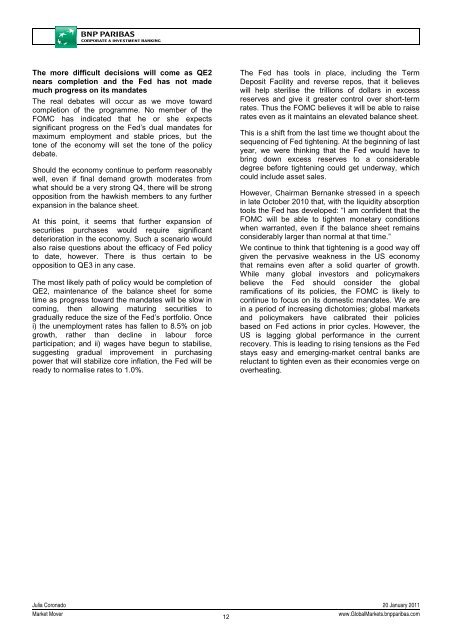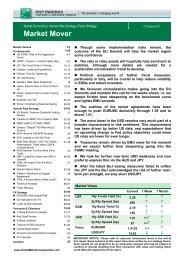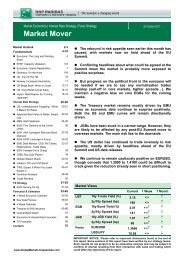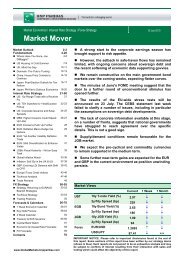Market Economics | Interest Rate Strategy - BNP PARIBAS ...
Market Economics | Interest Rate Strategy - BNP PARIBAS ...
Market Economics | Interest Rate Strategy - BNP PARIBAS ...
Create successful ePaper yourself
Turn your PDF publications into a flip-book with our unique Google optimized e-Paper software.
The more difficult decisions will come as QE2<br />
nears completion and the Fed has not made<br />
much progress on its mandates<br />
The real debates will occur as we move toward<br />
completion of the programme. No member of the<br />
FOMC has indicated that he or she expects<br />
significant progress on the Fed’s dual mandates for<br />
maximum employment and stable prices, but the<br />
tone of the economy will set the tone of the policy<br />
debate.<br />
Should the economy continue to perform reasonably<br />
well, even if final demand growth moderates from<br />
what should be a very strong Q4, there will be strong<br />
opposition from the hawkish members to any further<br />
expansion in the balance sheet.<br />
At this point, it seems that further expansion of<br />
securities purchases would require significant<br />
deterioration in the economy. Such a scenario would<br />
also raise questions about the efficacy of Fed policy<br />
to date, however. There is thus certain to be<br />
opposition to QE3 in any case.<br />
The most likely path of policy would be completion of<br />
QE2, maintenance of the balance sheet for some<br />
time as progress toward the mandates will be slow in<br />
coming, then allowing maturing securities to<br />
gradually reduce the size of the Fed’s portfolio. Once<br />
i) the unemployment rates has fallen to 8.5% on job<br />
growth, rather than decline in labour force<br />
participation; and ii) wages have begun to stabilise,<br />
suggesting gradual improvement in purchasing<br />
power that will stabilize core inflation, the Fed will be<br />
ready to normalise rates to 1.0%.<br />
The Fed has tools in place, including the Term<br />
Deposit Facility and reverse repos, that it believes<br />
will help sterilise the trillions of dollars in excess<br />
reserves and give it greater control over short-term<br />
rates. Thus the FOMC believes it will be able to raise<br />
rates even as it maintains an elevated balance sheet.<br />
This is a shift from the last time we thought about the<br />
sequencing of Fed tightening. At the beginning of last<br />
year, we were thinking that the Fed would have to<br />
bring down excess reserves to a considerable<br />
degree before tightening could get underway, which<br />
could include asset sales.<br />
However, Chairman Bernanke stressed in a speech<br />
in late October 2010 that, with the liquidity absorption<br />
tools the Fed has developed: “I am confident that the<br />
FOMC will be able to tighten monetary conditions<br />
when warranted, even if the balance sheet remains<br />
considerably larger than normal at that time.”<br />
We continue to think that tightening is a good way off<br />
given the pervasive weakness in the US economy<br />
that remains even after a solid quarter of growth.<br />
While many global investors and policymakers<br />
believe the Fed should consider the global<br />
ramifications of its policies, the FOMC is likely to<br />
continue to focus on its domestic mandates. We are<br />
in a period of increasing dichotomies; global markets<br />
and policymakers have calibrated their policies<br />
based on Fed actions in prior cycles. However, the<br />
US is lagging global performance in the current<br />
recovery. This is leading to rising tensions as the Fed<br />
stays easy and emerging-market central banks are<br />
reluctant to tighten even as their economies verge on<br />
overheating.<br />
Julia Coronado 20 January 2011<br />
<strong>Market</strong> Mover<br />
12<br />
www.Global<strong>Market</strong>s.bnpparibas.com

















